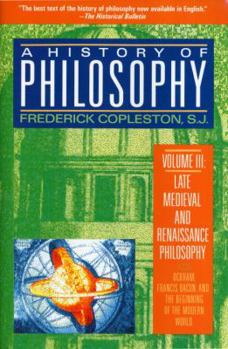A History of Philosophy 3: Ockham to Suarez
(Book #3 in the A History of Philosophy Series)
Select Format
Select Condition 
Book Overview
Conceived originally as a serious presentation of the development of philosophy for Catholic seminary students, Frederick Copleston's nine-volume A History Of Philosophy has journeyed far beyond the modest purpose of its author to universal acclaim as the best history of philosophy in English. Copleston, an Oxford Jesuit of immense erudition who once tangled with A. J. Ayer in a fabled debate about the existence of God and the possibility of metaphysics, knew that seminary students were fed a woefully inadequate diet of theses and proofs, and that their familiarity with most of history's great thinkers was reduced to simplistic caricatures. Copleston set out to redress the wrong by writing a complete history of Western philosophy, one crackling with incident and intellectual excitement -- and one that gives full place to each thinker, presenting his thought in a beautifully rounded manner and showing his links to those who went before and to those who came after him. The result of Copleston's prodigious labors is a history of philosophy that is unlikely ever to be surpassed. Thought magazine summed up the general agreement among scholars and students alike when it reviewed Copleston's A History of Philosophy as "broad-minded and objective, comprehensive and scholarly, unified and well proportioned... We cannot recommend [it] too highly."
Format:Paperback
Language:English
ISBN:0385468458
ISBN13:9780385468459
Release Date:March 1993
Publisher:Image
Length:496 Pages
Weight:0.92 lbs.
Dimensions:8.2" x 1.0" x 5.5"
Customer Reviews
2 ratings
As always, excellent
Published by Thriftbooks.com User , 17 years ago
One could almost say that volume 2 was a buildup to volume 3. In volume 2 Scholasticism and Neoplatonism was forged from Greek philosophy in order to create a Christian worldview. While there were changes made, like Aquinas modifying some of the conjectures of Aristotle and Augustine doing the same of Platonism, there was no real direct attack on these two thinkers. Aristotle's philosophy was almost synonymous with philosophy instead of a subset of philosophy. Here some of the doors are burst wide open, lead mostly by William of Ockham. Here he tears apart much of Aquinas's proofs for the existence of God, attacked many of the traditional ideas concerning universals, and paved the way to the emphasis on empirical study. Whether one agrees or not with the man, his thought was a much needed critique of established wisdom that too often degraded to spurious conjecture. There is some modified Scholasticism in the book by Suarez, who extends much of what Aquinas wrote, ans well as political philosophy developed much in part by the tension between Papal power and the powers of the State. Indeed, there is much here that paved the way for a new form of republic to emerge, as many of the philosophers states(rightly in my opinion), that political power was derived by God through the people, and a tyrant has no right of Authority. Like always, Copleston treats everyone fairly, and most certainly seems to have done his research given the depth of knowledge and a staggering bibliography. If you have time to tackle Copleston, you'll be rewarded for doing so.
Very useful tool in any serious study od philosophy
Published by Thriftbooks.com User , 17 years ago
Despite a lack in deep understanding of the subject itself, the work of Mr Copleston is a big contribution to the realm of philosophy. In his book we may always find detail historical facts often missing under similar titles in the books of other authors, however more prominent in their speculative backgrounds. Very interesting, particularly in this volume nr.3, which comprises the period of scholastic, is his own, less historical, views and standpoints toward the philosophy. If not a real philosophical deed, this book is indeed a challenge to every philosopher.






